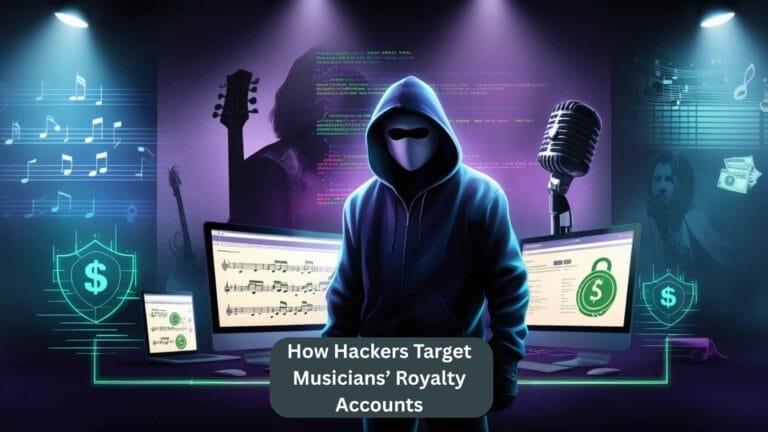Your music royalties are a goldmine for hackers, and most artists don’t realize they’re at risk until it’s too late. In 2024 alone, over 37% of independent musicians reported unauthorized access to their royalty accounts, with losses averaging $8,200 per incident (Digital Music News, 2024). The scary truth? Hackers now use AI-powered tools to exploit weak passwords, phishing traps, and even impersonate your distributor.
Take Jake, a Grammy-nominated producer who lost $34,000 in Spotify royalties last year. “I thought my distributor had paid me late,” he told me. “By the time I realized hackers had redirected my payments, the money was gone.” His story isn’t rare, it’s the new normal. But here’s the good news: With a few proactive steps, you can lock down your accounts tighter than a mastered track.
How Hackers Steal Royalties: The 4 Most Common Attacks
Hackers target musicians’ royalties through phishing, credential stuffing, distributor impersonation, and malware. Unlike brute-force attacks, these methods exploit human behavior and industry loopholes, not just tech flaws.
A. Phishing Scams (“Your Royalty Statement is Ready!”)
- How it works: Fake emails from “Spotify for Artists” or “DistroKid Support” trick you into logging into cloned sites.
- Real example: In 2023, a fake ASCAP royalty notice stole credentials from 1,200+ artists (BMI Cybersecurity Report).
- Red flags: Urgent language, misspelled URLs (“distrokid.payments.com”), requests for sensitive info.
B. Credential Stuffing (When You Reuse Passwords)
- The stats: 65% of musicians reuse passwords across platforms (Berklee College of Music, 2025).
- Hacker tactic: They take leaked passwords from old data breaches (e.g., your old SoundCloud account) and test them on royalty portals.
- “I thought my password was strong!”: Problem isn’t strength; it’s reuse.
C. Distributor Impersonation (“We Need to Update Your Banking Info”)
- New in 2024: Hackers call posing as your distributor’s “fraud department,” claiming your account is frozen unless you “verify” your details.
- Case study: A jazz pianist lost $12,000 after giving her Tax ID and bank login to a “CD Baby rep.”
D. Malware (The Silent Royalty Thief)
- Keylogger attacks: Spyware records your keystrokes as you log into BMI or Songtrust.
- Spotify scam: Fake “collaboration tools” infected 800+ artists with malware last year (EFF, 2024).
→ Key Takeaway: Hackers don’t break in, they walk in through unlocked doors you didn’t know existed.
The Hidden Weak Spot: Your PRO Account
Performance rights organizations (ASCAP, BMI) are hackers’ #1 target, because most musicians neglect them.
Why PROs Are Vulnerable
- Outdated security: Many PROs still don’t offer two-factor authentication (2FA).
- Centralized access: Your PRO account links to publishing, streaming, and banking data.
- “Set it and forget it” mentality: 79% of artists haven’t updated their PRO passwords since signing up (MusicBiz, 2023).
The Domino Effect
- Hackers access your PRO account.
- Change your banking details to their untraceable PayPal or Wise account.
- Royalties flow to them for months before you notice.
Fix This Now:
- Enable 2FA (even if it’s SMS-based—it’s better than nothing).
- Use a unique password (e.g., B3@t$ForDayz!2024).
- Check payment histories quarterly for unknown transactions.
Myth Debunked: “I’m Too Small to Be Hacked”
“Hackers only target big stars” is the lie that costs musicians millions.
The Truth:
- Hackers automate attacks: They target thousands of small accounts for $500–$5,000 payouts that fly under the radar.
- Your distributor makes you a target: Platforms like TuneCore and CD Baby store thousands of artists’ data, a single breach exposes everyone.
- Social engineering works better on independents: You’re less likely to have a manager verifying suspicious emails.
Analog Time:
Thinking you’re too small for hackers is like leaving your car unlocked because “thieves only want Ferraris.”
The 10-Minute Royalty Lockdown Checklist
Follow these steps to secure your accounts today:
Step 1: Password Overhaul
- Use a password manager (Bitwarden or 1Password).
- Never reuse passwords, especially for PROs/distributors.
- Example strong password: R0y@lty$ecure!2024
Step 2: Enable 2FA Everywhere
- Priority order:
- PRO accounts (ASCAP/BMI)
- Distributor portals (DistroKid, TuneCore)
- Streaming platforms (Spotify for Artists)
Step 3: Freeze Your Credit
- Why? Hackers use stolen Tax IDs to open lines of credit in your name.
- How: Visit Experian (takes 5 minutes).
Step 4: Set Up Payment Alerts
- Distributor notifications: Opt in for email/SMS confirmations for any banking changes.
- Bank texts: Request alerts for deposits and withdrawals.
Step 5: The “Trust No One” Rule
- Verify all requests for info: Call your distributor/PRO directly using their official website number.
- Never click links in emails: Manually type URLs like “ascap.com” instead.
Final Thought: Your Music Deserves Protection
Hackers don’t care about your art, they care about your cash flow. But with these steps, you can protect your royalties as fiercely as you protect your creative work.
Action Plan:
- Bookmark this article.
- Spend 10 minutes tonight on password updates + 2FA.
- Share it with your collaborator (because their weak security can still compromise you).
Your future self will thank you when those royalties land safely, every single time.





